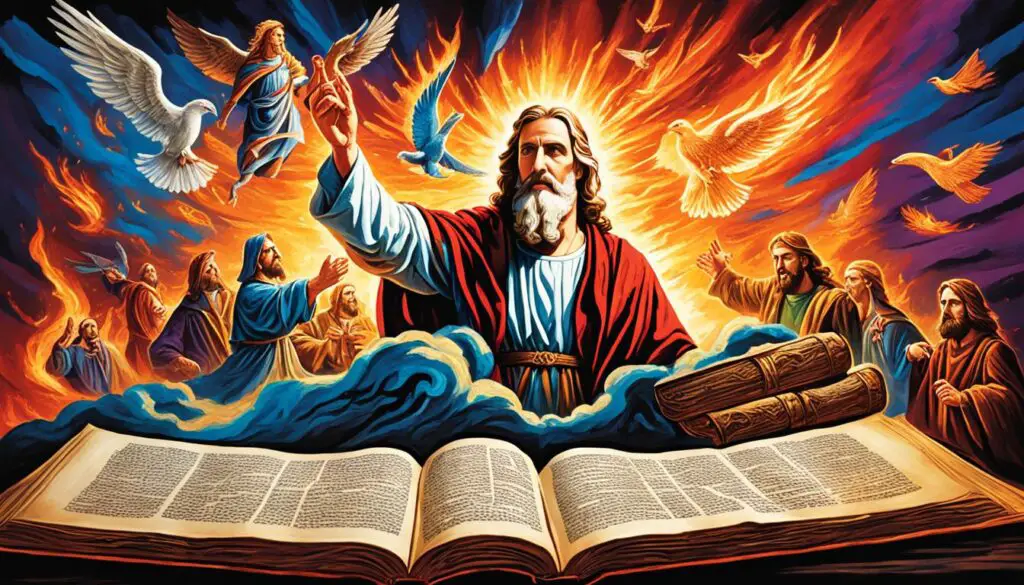When it comes to the biblical book Isaiah, there is much to be discovered and understood. The prophet Isaiah, author of this influential book, was an instrument of God’s divine messages during a crucial period in the Kingdom of Judah. His prophecies, spanning over four different reigns of Judean kings, hold immense significance for believers today.
In the biblical context, the book of Isaiah is a comprehensive portrait of Jesus Christ in the Old Testament. While some scholars debate the authorship and propose multiple writers, the book as a whole contains significant prophecies about Jesus, including his birth, ministry, sacrificial death, and glorious second coming.
To truly grasp the depth and meaning of Isaiah, it is vital to understand its historical and literary context. By examining the life of Isaiah and the backdrop of his prophecies, we can unveil the profound teachings within this biblical masterpiece.
Key Takeaways:
- The biblical book Isaiah is attributed to the prophet Isaiah, who served during the reign of four Judean kings.
- Isaiah’s prophecies contain profound insights into the life and work of Jesus Christ in the Old Testament.
- Understanding the historical and literary context of Isaiah is essential for grasping its teachings.
- The book offers a mix of messages, including judgment, salvation, repentance, and the hope of restoration.
- Exploring Isaiah’s teachings can deepen our understanding of God’s redemptive plan and forge a closer relationship with Him.
The Author and Historical Context of Isaiah
Isaiah, married to a prophetess, prophesied primarily in Jerusalem and experienced the reign of four Judean kings. He likely lived during the eighth century BC and was martyred by King Manasseh. While some scholars propose multiple authors, this position disregards the predictive prophecies about Jesus Christ found throughout the book. Isaiah’s prophecies were directed to the people of Judah, who had turned away from God and needed to hear messages of both judgment and hope for restoration.
The Message and Themes of Isaiah
The book of Isaiah encompasses a wide range of themes, including judgment, salvation, repentance, and the hope of future restoration. Isaiah’s central theme is the salvation of Yahweh and the need for the people to return to God in humility and obedience.
The book vividly portrays God’s judgment on disobedience and rebellion, balanced with His faithfulness to His promises and His plan for redemption. The prophecies in Isaiah have both immediate historical significance and far-reaching implications, pointing to the coming of the Messiah and the ultimate victory of God’s kingdom.
“Return to Me, for I have redeemed you.”
– Isaiah 44:22
The Salvation of Yahweh
Isaiah emphasizes the salvation of Yahweh, highlighting God’s desire to reconcile with His people and bring them back into a right relationship with Him. The book reveals that God’s judgment and discipline are not meant to destroy, but rather to lead the people to repentance and restoration.
The Call to Repentance
Isaiah calls the people to repentance, urging them to turn away from their sinful ways and return to God. He emphasizes the importance of humility and obedience, highlighting that God desires genuine transformation and a heart set on righteousness.
- Repent and seek the LORD while He may be found (Isaiah 55:6-7)
- Wash yourselves, make yourselves clean (Isaiah 1:16)
- Learn to do good; seek justice, correct oppression (Isaiah 1:17)
The Hope of Future Restoration
Isaiah offers hope for the future, promising that God will restore His people and establish His kingdom. The prophecies in Isaiah provide assurance of deliverance, ultimate victory over evil, and the coming of the Messiah who will bring salvation and eternal peace.
Themes in the Book of Isaiah
| Themes | Relevant Passages |
|---|---|
| Salvation | Isaiah 43:11, Isaiah 45:22 |
| Repentance | Isaiah 55:7, Isaiah 1:16-17 |
| Hope | Isaiah 9:6, Isaiah 11:1-5 |
| Judgment | Isaiah 24:1-6, Isaiah 5:25 |
| Restoration | Isaiah 49:6, Isaiah 65:17-25 |
Key Teachings and Prophecies in Isaiah
Isaiah contains numerous key teachings and prophecies that have shaped faith and understanding for centuries. From the announcement of Jesus’ coming to His birth, ministry, death, and return, Isaiah reveals the full scope of the Messiah’s life and work.
“Therefore the Lord himself will give you a sign: The virgin will conceive and give birth to a son, and will call him Immanuel.” – Isaiah 7:14
One of the notable prophecies in Isaiah includes the promise of a virgin birth, reinforcing the miraculous nature of Jesus’ arrival on Earth.
“But he was pierced for our transgressions, he was crushed for our iniquities; the punishment that brought us peace was on him, and by his wounds we are healed.” – Isaiah 53:5
The suffering servant prophecy in Isaiah 53 foreshadows Jesus’ sacrificial death on the cross and the redemption and healing that believers receive through His sacrifice.
“See, I will create new heavens and a new earth. The former things will not be remembered, nor will they come to mind.” – Isaiah 65:17
Isaiah also prophesies the future establishment of God’s kingdom on earth, symbolizing the ultimate victory and eternal reign of God.
Isaiah’s teachings provide profound insights into the nature of God, the consequences of disobedience, and the hope of redemption through the promised Messiah.

Isaiah’s Relevance and Application Today
Despite being written thousands of years ago, Isaiah’s teachings and prophecies continue to be relevant and applicable today. The book challenges readers to examine their own lives and consider their obedience to God’s commands.
Isaiah highlights the sins of God’s people, such as injustice and hypocrisy, encouraging believers to seek purity in their love for God and others.
The messages of repentance, hope, and salvation in Isaiah remind Christians of the enduring faithfulness of God and the need to trust in His promises.
The Importance of Self-reflection
Isaiah’s teachings prompt individuals to engage in self-reflection, evaluating their actions and attitudes in light of God’s standards. By honestly assessing themselves, believers can identify areas of sin and seek forgiveness, growth, and transformation.
“Wash yourselves; make yourselves clean; remove the evil of your deeds from before my eyes; cease to do evil, learn to do good; seek justice, correct oppression; bring justice to the fatherless, plead the widow’s cause.” – Isaiah 1:16-17
Seeking Justice and Loving Kindness
Isaiah emphasizes the importance of seeking justice, correcting oppression, and advocating for the vulnerable members of society. Believers are called to actively pursue righteousness and compassion, reflecting God’s character in their interactions with others.
“Learn to do good; seek justice, correct oppression; bring justice to the fatherless, plead the widow’s cause.” – Isaiah 1:17
Hope and Trust in God’s Promises
Isaiah’s prophecies offer a message of hope and assurance in God’s faithfulness. Despite the challenges and trials believers may face, they can find comfort in the knowledge that God is in control and His promises will be fulfilled.
“So do not fear, for I am with you; do not be dismayed, for I am your God. I will strengthen you and help you; I will uphold you with my righteous right hand.” – Isaiah 41:10

Understanding the Structure of Isaiah
When studying the book of Isaiah, it is crucial to comprehend its structure and divisions. The book is commonly divided into three sections:
- Chapters 1-39
- Chapters 40-55
- Chapters 56-66
These divisions are the result of scholarly analysis based on the content found in each section. Some scholars even propose different authors or time periods for each section. However, it is important to note that these divisions can potentially diminish the power of the book’s unified message about the Messiah.
The overall structure of Isaiah reveals a combination of prophetic judgments and promises, all with a clear focus on God’s plan for redemption and restoration. By understanding the structure of Isaiah, readers can delve deeper into the profound teachings of this biblical book.

The Structure of Isaiah
| Section | Description |
|---|---|
| Chapters 1-39 | This section primarily addresses the judgment of God upon the people of Judah and other nations due to their disobedience and idolatry. |
| Chapters 40-55 | Often referred to as Deutero-Isaiah, this section focuses on the theme of consolation and predicts the restoration of Jerusalem, the redemption of Israel, and the coming of the Messiah. |
| Chapters 56-66 | Known as Trito-Isaiah, this section emphasizes ethical concerns, the hope of glory for the faithful, and the final judgment of God upon the unrighteous. |
The Impact of Isaiah on Faith and Understanding
The book of Isaiah has had a profound impact on faith and understanding throughout history. It provides insights into the nature of God, the need for repentance, and the hope of salvation through Jesus Christ. Isaiah’s prophecies about the Messiah have been foundational in shaping Christian theology and belief.
“For to us a child is born, to us a son is given, and the government will be on his shoulders. And he will be called Wonderful Counselor, Mighty God, Everlasting Father, Prince of Peace.” – Isaiah 9:6
The teachings in Isaiah continue to inspire believers to seek God’s righteousness, embrace His redemptive work, and live in hope of the future fulfillment of His promises. Isaiah’s message touches the hearts of people, reassuring them of God’s love, mercy, and faithfulness. The impact of Isaiah extends beyond its historical context, resonating with individuals from different generations and cultures, inviting them to encounter the transforming power of God.
The Significance of Isaiah’s Prophecies
Isaiah’s prophecies stand as a testament to the divine inspiration behind the biblical text. The accuracy and detail in these prophecies confirm the power of God to foretell future events and His sovereignty over all creation. Through Isaiah, God reassures His people of His presence and His plans for their redemption.
One of the most significant prophecies in Isaiah is found in chapter 53, which foretells the suffering and atoning sacrifice of the Messiah. This prophecy foreshadows Jesus Christ’s crucifixion and the salvation He offers to humanity through His death and resurrection. The fulfillment of Isaiah’s prophecies in the life of Jesus strengthens the faith and understanding of believers, solidifying the divine origin and authority of the Bible.
Relevance in Modern Times
The impact and significance of Isaiah extend beyond ancient times and continue to hold relevance in the modern world. The timeless truths and teachings found in Isaiah speak to the struggles, challenges, and questions of contemporary individuals. Isaiah’s call for repentance, justice, and righteousness transcends cultural and societal boundaries, resonating with people from all walks of life.
In a world filled with uncertainty and turmoil, Isaiah’s message offers hope, comfort, and guidance. It reminds believers that God is faithful and steadfast, even in the midst of adversity. Isaiah’s prophecies about the coming of Christ and the realization of God’s kingdom give believers the assurance that God’s ultimate plan of redemption and restoration will come to fruition.
The Impact of Isaiah: A Summary
The impact of Isaiah on faith and understanding cannot be overstated. Its teachings have transformed lives, shaped theological thought, and provided a foundation of hope for countless individuals. Isaiah’s prophecies about the Messiah and the promises of restoration through God’s grace continue to draw believers closer to God, leading them to a deeper understanding of His redemptive plan.
Through Isaiah, we discover the unwavering love and faithfulness of God, the call to repentance and obedience, and the hope of salvation through Jesus Christ. As we delve into the book of Isaiah, we are invited to explore the depths of God’s wisdom and the profound impacts that His Word can have on our lives.

Conclusion
The insightful book of Isaiah plays a pivotal role in enhancing our understanding of faith and the profound teachings of the Bible. Through Isaiah’s prophecies, we gain valuable insights into the nature of God, the dire consequences of disobedience, and the glorious hope of salvation through the promised Messiah. These prophecies about Jesus Christ and the future restoration of God’s kingdom continue to shape the faith and perspective of believers today.
By diligently studying and applying the teachings of Isaiah, individuals can delve deeper into God’s redemptive plan and experience transformative growth in their relationship with Him. Isaiah’s powerful and relevant messages challenge believers to examine their lives, seek righteousness, and embrace God’s steadfast love and faithfulness. His teachings inspire us to live with hope, trust in God’s promises, and eagerly anticipate the fulfillment of His plans for our future.
In conclusion, the book of Isaiah serves as a beacon of divine wisdom and guidance, offering us key insights into God’s character, His redemptive work, and His ultimate plan for humanity. As we immerse ourselves in the profound teachings of Isaiah, we are empowered to walk in faith, mature in our understanding of God’s purposes, and experience the transformative power of His grace. May we continue to explore the timeless truths of Isaiah’s prophecies and allow them to shape our lives, bringing us closer to the heart of God.
FAQ
Who is Isaiah in the Bible?
Isaiah is the author of the biblical book that bears his name. He served as a prophet in the Kingdom of Judah during the reigns of four Judean kings.
What is the historical context of Isaiah?
Isaiah likely lived during the eighth century BC in Jerusalem and experienced the reign of four Judean kings. He prophesied primarily in Jerusalem and was martyred by King Manasseh.
What are the main themes in the book of Isaiah?
The book of Isaiah encompasses themes of judgment, salvation, repentance, and hope for future restoration. Its central theme is the salvation of Yahweh and the need for the people to return to God in humility and obedience.
What are some key teachings and prophecies in Isaiah?
Isaiah contains prophecies about the birth, ministry, sacrificial death, and second coming of Jesus Christ. Notable prophecies include the virgin birth, the suffering servant, and the future establishment of God’s kingdom on earth.
How can the teachings of Isaiah be applied today?
The teachings of Isaiah challenge readers to examine their own lives and consider their obedience to God’s commands. They highlight the consequences of disobedience and the hope of redemption through the promised Messiah.
What is the structure of the book of Isaiah?
The book of Isaiah is often divided into three sections: chapters 1-39, chapters 40-55, and chapters 56-66. These divisions, based on content analysis, can diminish the book’s unified message about the Messiah.
How has Isaiah impacted faith and understanding?
The book of Isaiah has had a profound impact on faith and understanding throughout history. It provides insights into the nature of God, the need for repentance, and the hope of salvation through Jesus Christ.
What are the key insights from Isaiah?
Isaiah provides key insights into the nature of God, the consequences of disobedience, and the hope of salvation through the promised Messiah. Studying and applying the teachings of Isaiah can deepen understanding of God’s redemptive plan and foster a closer relationship with Him.







